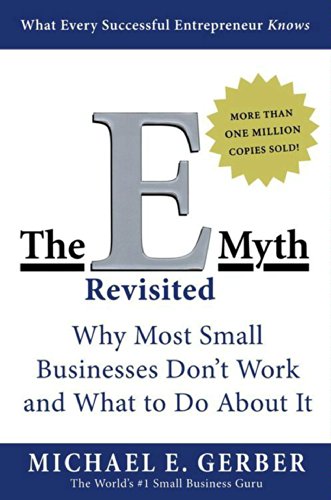The E Myth Book Summary
"The E-Myth Revisited" by Michael E. Gerber is a thought-provoking and eye-opening book that challenges conventional wisdom about entrepreneurship and small business ownership. Drawing upon his extensive experience as a business consultant, Gerber presents a compelling argument for why most small businesses fail and offers practical insights and strategies to overcome common pitfalls.
The central premise of the book revolves around the "entrepreneurial myth," which suggests that the key to a successful small business lies solely in the technical expertise of the owner. Gerber argues that this belief often leads entrepreneurs to fall into the trap of working in their businesses rather than on their businesses. He introduces the concept of three distinct roles that every entrepreneur must fulfill: the technician, the manager, and the entrepreneur.
Gerber highlights the importance of adopting an entrepreneurial mindset, where the business owner focuses on creating systems, processes, and strategies that can be replicated and scaled. He emphasizes the significance of developing a clear vision, purpose, and long-term goals for the business, and outlines the steps to create a comprehensive business plan that encompasses all aspects of the organization.
Throughout the book, Gerber introduces the concept of the "turn-key revolution," which emphasizes the need to systematize and standardize business operations to achieve consistency and efficiency. He guides readers through the process of developing standardized operating procedures, employee training manuals, and clearly defined job roles to ensure that the business functions smoothly and independently of the owner's direct involvement.
Gerber also addresses the importance of building a strong team and delegating responsibilities effectively. He stresses the need to hire and train individuals who possess the necessary skills and share the vision and values of the business. By empowering employees and encouraging them to take ownership of their roles, entrepreneurs can free themselves from day-to-day operations and focus on strategic growth and development
One of the key takeaways from the book is the notion of working on the business, not just in the business. Gerber emphasizes the importance of setting aside time for strategic planning, innovation, and continuous improvement. By embracing the role of the entrepreneur and adopting a proactive approach to business management, entrepreneurs can lay the foundation for long-term success and sustainable growth.
"The E-Myth Revisited" is a valuable resource for entrepreneurs, small business owners, and anyone aspiring to start their own business. Gerber's engaging storytelling, coupled with practical advice and actionable strategies, provides a roadmap for transforming small businesses into well-organized and thriving enterprises. By challenging conventional notions and offering a fresh perspective on entrepreneurship, Gerber equips readers with the tools and insights needed to overcome common challenges and build a business that not only survives but thrives in the long run.
Here's 5 key takeaways from "The E-Myth Revisited" by Michael E. Gerber
1. The Entrepreneurial Myth:
Gerber challenges the prevailing belief that technical expertise alone is enough to run a successful small business. He argues that many entrepreneurs start businesses based on their passion and skill in a particular field, assuming that their expertise will naturally translate into business success. However, Gerber explains that being a technician, or someone who is skilled at the technical work of the business, is just one of the necessary roles. To truly succeed, entrepreneurs must also take on the roles of manager and entrepreneur. The manager focuses on creating systems and processes, while the entrepreneur sets the strategic direction and vision for the business. Understanding and embracing these different roles is essential for long-term success.
2. Work on Your Business, Not Just in It:
Gerber emphasizes the importance of entrepreneurs taking a step back from day-to-day operations to work on their businesses. This means setting aside dedicated time to focus on strategic planning, innovation, and growth. By prioritizing this "working on the business" time, entrepreneurs can develop a clear vision for their company, identify areas for improvement, and devise strategies to achieve long-term goals. It allows them to assess the bigger picture and make informed decisions that will propel the business forward.
3. Systematize and Standardize:
Gerber highlights the value of systematizing and standardizing business operations. This involves creating documented processes, procedures, and policies that can be replicated and followed consistently. By systematizing operations, entrepreneurs can ensure that tasks are performed efficiently, consistently, and to the desired quality standards. Standardization enables employees to follow predefined steps, reducing errors and increasing productivity. It also allows for easier training and onboarding of new employees, as they have clear guidelines to follow. Ultimately, systematizing and standardizing the business creates a foundation for scalability, growth, and increased efficiency.
4. Building a Strong Team:
Gerber underscores the significance of hiring and developing a strong team that aligns with the vision and values of the business. It involves identifying key roles and responsibilities, defining clear job descriptions, and hiring individuals who possess the necessary skills, attitude, and potential for growth. Investing in employee training and development helps build a skilled and motivated workforce that can contribute to the success of the business. By delegating tasks to capable team members and empowering them to take ownership, entrepreneurs can free up their own time and focus on strategic activities that drive the business forward.
5. Embrace the Turn-Key Revolution:
Gerber introduces the concept of the turn-key revolution, which involves creating a business that can operate independently of the owner's direct involvement. This is achieved by developing comprehensive systems and processes that encompass all aspects of the business. The goal is to create a business that can be easily replicated or scaled, even if the owner is absent. By documenting standard operating procedures, training manuals, and job roles, entrepreneurs can ensure that the business runs smoothly and consistently, regardless of personnel changes. Embracing the turn-key revolution mindset enables entrepreneurs to build a valuable and sustainable business that can continue to thrive beyond their individual efforts.
These expanded explanations delve deeper into the key takeaways from "The E-Myth Revisited," emphasizing the importance of understanding and embracing the roles of technician, manager, and entrepreneur, working on the business through strategic planning, systematizing operations, building a strong team, and adopting the turn-key revolution mindset. By applying these principles and strategies, entrepreneurs can overcome common challenges, build resilient businesses, and position themselves for long-term success.
A Step-By-Step Approach To How You Could Implement The Concepts From 'The e-Myth' into Your Business
Step 1: Embrace the Three Roles
Start by understanding the distinct roles of the technician, manager, and entrepreneur. Assess your strengths and weaknesses in each area and identify areas for improvement. Strive to embody all three roles to effectively manage and grow your business.
Step 2: Work on Your Business
Allocate dedicated time to work on your business, focusing on strategic planning and long-term vision. Create a schedule and set aside specific blocks of time to prioritize strategic activities, such as goal setting, business development, and process improvement.
Step 3: Systematize Operations
Analyze your current processes and identify areas for systematization. Document standard operating procedures and create clear guidelines for each aspect of your business. This will ensure consistency and efficiency, making it easier to delegate tasks and scale your operations.
Step 4: Build a Strong Team
Define key roles within your organization and identify the skills and qualities required for each position. Develop a hiring process that attracts individuals who align with your vision and values. Invest in employee training and development to foster a motivated and capable team that can contribute to your business's success.
Step 5: Embrace the Turn-Key Revolution
Create a business that operates independently of your direct involvement. Implement comprehensive systems and processes, documenting every aspect of your operations. This enables your business to function smoothly, even if you're not physically present.



